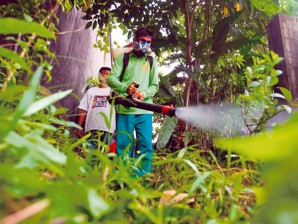Dengue cases up in Metro, 3 regions

IS FOGGING EFFECTIVE? A health worker uses a fogging machine to kill dengue-carrying mosquitoes in a vacant lot in Cubao, Quezon City, on Thursday. Fogging is effective in killing adult mosquitoes but it does not kill larvae. Community cleanliness is more effective in fighting dengue. MARIANNE BERMUDEZ
In just four days starting Monday, East Avenue Medical Center in Quezon City recorded 185 dengue cases, said Dr. Ma. Victoria Abesamis, the chief of clinics.
Up to three children share a bed in the hospital. Some even have to stay in monobloc chairs instead of resting in beds in crowded wards, according to Abesamis.
JC Bolo said he didn’t know how his 6-month-old baby got dengue. He said it pained him to see that baby Gabriel had to suffer while being given intravenous fluid therapy.
Maricel Labuyo said her daughter Wendy, a Grade 6 student from Balara Elementary School, must have acquired dengue at school.
“Dengue can hit anyone, even adults, but it usually affects children,” said Dr. Flor Uy-Ty, the critical care chief of Philippine Children’s Medical Center.
Ty said children were playful, unmindful of places where mosquitoes maybe found.
The number of dengue cases nationwide is down by a third this year, but four regions, including Metro Manila, have registered increases of up to triple the numbers of last year, according to the Department of Health (DoH).
Ilocos, Cagayan Valley and Central Luzon are the other regions that are seeing a surge in dengue cases.
Peak month
The latest DoH report on dengue, issued early this week, said that a total of 45,333 dengue cases were reported from Jan. 1 to Aug. 6. It recorded 267 deaths, down from last year’s 539.
The DoH said the number of cases nationwide was expected to further rise particularly this month, considered the dengue peak month.
In Metro Manila, the number of dengue cases rose to 10,487 as of Aug. 6, nearly double last year’s 5,416.
Except Marikina
All 16 cities and one municipality in the metropolis saw increases in dengue cases, except in Marikina City.
Cases in Taguig and Pasig cities nearly tripled, while cases in Caloocan, Las Piñas, Malabon, Muntinlupa, Parañaque, Valenzuela and San Juan cities more than doubled.
Quezon City, Caloocan City and Manila also reported a big number of cases.
Of the total cases nationwide, Metro Manila accounted for 23.13 percent, followed by Central Luzon (7,566 cases or 16.69 percent), Ilocos (4,981 or 10.99 percent) and Cagayan (3,079 or 6.79 percent).
Fifty-three percent of the dengue patients nationwide were male, and 40 percent were aged 10 and below, according to the DoH report.
The report noted that while the number of cases went down nationwide, this was not true in the four regions.
Ilocos and Central Luzon saw their dengue cases tripled. Ilocos had 4,981 cases this year compared with last year’s 1,292—an increase of 285.53 percent.
Central Luzon had 7,566 cases this year, an increase of 226 percent.
Cagayan Valley’s 3,079 cases had already exceeded last year’s 2,079.
Express lanes
The health office in Quezon City on Thursday designated dengue express lanes in 61 health centers to attend to suspected dengue cases, particularly in barangays placed on the alert threshold level.
“The express lanes will ensure immediate medical attention to patients at health centers with suspected dengue symptoms,” said Dr. Antonieta Inumerable, a city health officer.
The express lanes in health centers are in addition to super health centers in Quezon City, which are primarily designated as lying-in clinics, but are now open to emergency cases, including dengue cases.
“All health centers are provided with an adequate supply of medicines, such as paracetamol and oral hydration solutions, to help address the needs of residents,” Inumerable said.
Cleanup drive
Mindful of the persistent dengue threat, the Department of the Interior and Local Government (DILG) called on governors, mayors, barangay chairs and local health officers to hold cleanup drives for two consecutive weekends beginning Saturday.
Interior Secretary Jesse M. Robredo asked local chief executives to clean up their areas on Aug. 20-21 and 27-28 to help prevent the spread of dengue cases in the country.
In a directive, Robredo asked the local officials to conduct “search-and-destroy operations” of all potential breeding places of dengue-carrying mosquitoes in their areas of jurisdiction.
Local officials were also urged to dredge clogged canals and other waterways, prune thick bushes or tree branches, remove or drain receptacles containing stagnant water, and conduct a massive information drive on environmental control of breeding sites, especially in endemic areas.
Blood donation
The Philippine National Police said it would schedule blood donation activities among its personnel to ensure a healthy supply for dengue patients, particularly severe cases which typically require blood transfusion.
PNP Deputy Director General Nicanor Bartolome said he had directed the PNP’s community relations group to coordinate with the DOH and other agencies in the government campaign against dengue.
In a briefing, Bartolome said only qualified and willing members of the 140,000-strong police force would be asked to donate blood. Reports from Penelope Endozo, Jerome Aning, Julie M. Aurelio and DJ Yap














